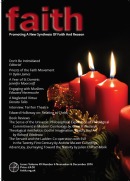
A Neglected Virtue?
Article:
01.12.16
Our Holy Father Pope Francis has given us a wonderful living example of what true humility is, and humility is indeed a central theme of his Pontificate as well as being a central theme of the Year of Mercy. However, humility is not always easy to put into practice. As pointed out by St Benedict, the Father of Western Monasticism, “it is hard to be humble”. Humility is a concept that comes from within one’s soul, a concept that can help to bring us closer to God and closer to those around us, making us more stable and well-formed individuals.
It has never been more important for Christians and indeed all people to seek to be truly humble. St Benedict and his Rule can help to inspire us; following his ideas within our lives can help us all to put our faith into action in ways that are genuine and much needed in today’s society.
The virtue of humility must not be misunderstood or misinterpreted; we must avoid being falsely ‘umble’ like David Copperfield’s Uriah Heap. We must seek to be humble by opening our hearts to the true meaning of humility and, as St Benedict says, “keeping the fear of God before our eyes in all that we do”.
St Benedict dedicated the entire seventh chapter of his Rule to the concept of humility and it has a great deal to teach us when considering the idea of mission and living the faith of the church. Humility is most certainly the basis for an effective faith lived out in daily life.
While each of St Benedict’s twelve steps of humility (which are listed below) have a strong message of their own, the second step in particular is quite a striking one, being of great importance in today’s society which is so full of consumerism, family breakdowns, celebrity culture, social media, vanity and many other problems and challenges.
Humility is a concept that comes from within one’s soul, a concept that can help to bring us closer to God and closer to those around us, making us more stable and well-formed individuals.
The second step of humility is based on the Lord’s saying “I have not come to do my own will but the will of him who sent me” (Jn 6:38) and suggests that we should not love our own desires or take pleasure in them but we should model ourselves around the above saying of Our Lord, which is not an easy thing to do.
I am not suggesting that we must all seek to live monastic lives, but the virtue of humility as explored by St Benedict has so much to teach us, especially if we are called to be Christ in our lives on earth and to see Christ in others. It was Mother Teresa who in 1987 said “you get closer to Christ by coming closer to each other on earth”. Perhaps by demonstrating greater love and care to those around us, particularly those within our own family and especially those who are unwell or marginalised within society; by reaching out to those who are struggling in life, in need of comfort or support – and by valuing them all as human beings – then we can all indeed be true disciples of Christ on earth.
The Eucharist must always be the central point of our faith but, as Scripture tells us, we are called to be disciples and witness to Christ in our world today, not simply at the Eucharistic Table but by being Christ in our world and seeing Christ in others. This we do through our daily thoughts, actions and deeds.
We are reminded in Psalm 7 that “God knows our hearts and our minds”. Perhaps as this Year of Mercy draws to its end, St Benedict’s rule can inspire us and help us to deepen our faith and fellowship towards others on earth. I would greatly encourage people of all faiths and none to explore the Rule of St Benedict. You might be surprised by what you find and, like me, find it a useful tool to help bring you closer to God.
These are St Benedict’s twelve steps of humility within his Holy Rule which members of monastic orders must follow:
1. Always be aware of the presence of God
2. Love not doing his own will but the will of God
3. Submit to the Abbot in obedience
4. Obey superiors even in hardship
5. Confess his sins to a spiritual father
6. Be content with his circumstances
7. Believe in his heart that he is least of the brothers
8. Follow the rule and tradition of the monastery
9. Refrain from excessive speech
10. Refrain from raucous laughter
11. Speak as is appropriate in a monastery
12. Keep a humble bearing in his body
Notes:
Donato Tallo is a registered nurse working in the acute hospital sector





